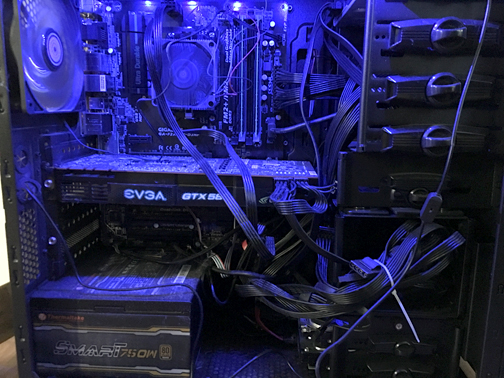
By Charly SHELTON
Today’s world is a wired one. Internet use has become as commonplace as telephone or TV use, and many companies rely on some sort of Internet resource to facilitate the day-to-day tasks of running their business. So with an integral part of daily lives being online, what happens when a cyber attack hits? Questions need to be asked such as can your computer publish all your bank records online and can your SmartTV spy on you?. Unfortunately the answer is yes. To all of it.
The big news last week was the DDoS attack on many popular websites. DDoS – Distributed Denial of Service –is a fairly basic cyber attack. According to ATLAS Threat Report, more than 2000 DDoS attacks occur worldwide every day. Hackers can plant a few lines of code in an email or on a website that installs to private devices to create a “botnet,” an interconnected network of computers that can be controlled remotely by the hacker who built it. The botnet can then be called to action as thousands of soldiers in the cyber attack. The target website is attacked by sending huge data streams or server requests from those botnet computers to the website’s home server to eat up all the bandwidth and block the server for any other incoming requests. In layman’s terms, it sends a horde of computers to overwhelm the website and no true users can get to it.
But worse than that is the targeted hack. This is when hackers, either working alone or with colleagues, can break into private servers and steal emails, information, photos – whatever they want – and spread it online through cutouts like WikiLeaks. This is what happened in July when Guccifer 2.0, a hacker now known to be affiliated with the Russian government, hacked the Democratic National Committee and released the information online.
These types of cyber crimes are under constant watch from various governmental agencies, said Rep. Adam Schiff, Crescenta Valley’s local representative and the ranking member of the House Permanent Select Committee on Intelligence, which oversees the nation’s intelligence activities, including the Central Intelligence Agency (CIA), the Office of the Director of National Intelligence (DNI) and the National Security Agency (NSA). With the national election so near, targeted cyber crime can have lasting consequences, not only through leaks but also through the voting system.
“So first is the cyber meddling in our elections, which is troubling in and of itself,” said Schiff. “But then you have the fact that there have also been hacks of our state election offices and our voter registration databases. And while those are unlikely to change the vote count they could create chaos or confusion if, for example, they tinkered with the registrations so that when people went to vote, they didn’t show up on the voter rolls. Those are things that would require people to vote provisionally. Again, that’s something that in a swing state could sow some discord, but unlikely at the end of the day to alter the result.
“Then you have some states that allow people to vote electronically or request their ballots overseas using electronic means. That is vulnerable to some mischief as well. These are all things that the states are doing their best to guard against.”
The Dept. of Homeland Security has offered its support to any state offices that would like an extra hand in beefing up their cyber security in scheduled tests and preventive measures, Schiff said.
The stakes for this election have risen in regard to the threat posed by hackers in Russia. The decisions made by American voters on Tuesday can lead to worldwide repercussions in international relations. Schiff stressed the importance of being absolutely forthcoming in the voting process.
“This has been such a negative campaign and you have had a foreign power, an adversarial power, trying to influence the result and trying to sow discord,” Schiff said. “And you have a campaign saying that it may not accept the results if it doesn’t win. For all those reasons, it’s essential that everything be done to make sure that the elections are transparent and people have confidence in the result.”
Although less than a week away, there is still a risk of attack. One possibility Schiff illustrated can be more damaging than anything released prior to the home stretch of the campaigns.
“I have to say the thing that concerns me most is not so much that I think the Russians can hack in and alter the result on election day, but rather if the Russians do what they have done to some of the other countries in Europe. It’s one thing to hack an institution, it’s another to leak documents. And the Russians have done both,” Schiff said. “What is yet another escalation is for the Russians to hack into a campaign and then forge documents and dump the forged documents along with the real ones. They’ve done this in Europe and if they were to do something like that this week, when there isn’t time to demonstrate that a document suggesting something heinous was forged, that could have an election-altering impact that could really cause chaos.”
Schiff added, “For my own point of view, working in national security issues, I’m deeply concerned that we have a candidate that seems to be very beholden to an adversarial power.”
